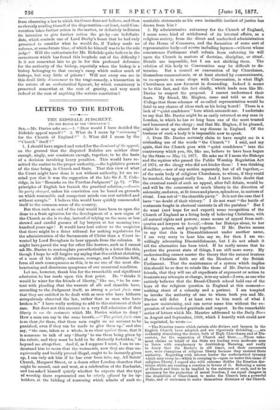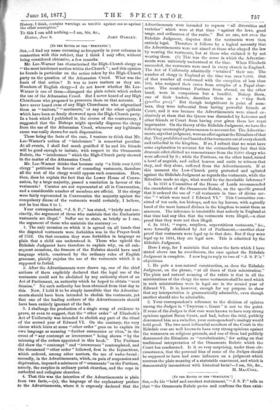LETTERS TO THE EDITOR.
THE RIDSDALE JUDGMENT.
(TO THE EDITOR OF THE"SPECTATOR."]
SIR, —Mr. Davies asks me,-1. "How would I have decided the Ridsdale appeal myself?" 2. What do I mean by "autonomy" for the Church of England ?" 3. What did I mean by the " Church " itself ?"
1. I should have argued and voted for the dismissal of the appeal, on the ground that the disputed Rubrics are neither clear
enough, singly, nor consistent enough, together, to be the basis of a decision involving heavy penalties. This would have re- mitted the matter to the proper authority,—the legislative powers of the time being, in Church and State. That this view of what the Court might have done is not without authority, let me re- mind you that it was the suggestion of the late Sir J. T. Cole-
ridge, in his "Remarks on the Purchas Judgment" (p. 9). "The principles of English law furnish the practical solution,—dismiss the party charged, unless his conviction can be based on grounds on which reasonable and competent minds can rest satisfied and without scruple." I believe this would have quickly commended itself to the common-sense of the country.
But then such an end of the trial would have been to open the door to a fresh agitation for the development of a new organ of the Church as she is to-day, instead of relying on the more or less shrewd and candid guesses of lay lawyers at her meaning two hundred years ago ! It would have lent colour to the suspicion that there might be a fitter tribunal for making regulations for the administration of the Sacraments of Christ than a Court in- vented by Lord Brougham to hear appeals from the colonies. It might have paved the way for other like horrors, such as I cannot ask Mr. Davies to contemplate parenthetically in a letter like this, though I hope he will forgive my saying that the evident shrinking of a man of his ability, calmness, courage, and Christian faith, from all such consequences as this, is to me one of the most dis- heartening and disastrous symptoms of our unnatural condition.
Let me, however, thank him for the remarkable and significant admission he has made upon this first point. He "thinks it would be wiser for the friends of liberty," like me, "to be con- tent with pleading that the wearers of alb and chasuble have, according to the Judgment itself, so strong a prima fade case that they are entitled to be dealt with as men who have hitherto scrupulously observed the law, rather than as men who have broken it." I have really nothing to add to this statement of their case. But does not this amount to a very full admission of that liberty to use the vestments which Mr. Davies wishes to deny ? How a man can say in the same breath,—" The prima facie case is so clear for them, that these men ought on no account to be punished, even if they can be made to give them up," and also say, "the case, taken as a whole, is so clear against them, that it is nonsense to talk of any 'liberty' to use them being given by the rubric, and they must be held to be distinctly forbidden," is beyond me altogether. And if, as I suppose I must, I am to un- derstand him to mean that the vestments, now they are thus un- equivocally and lucidly proved illegal, ought to be instantly given up, I can only ask him if he has ever been into, say, All Saints' Church, Margaret Street, or a dozen other London churches that might be named, east and west, at a celebration of the Eucharist, and has asked himself quietly whether he expects that the type of worship there represented can be utterly effaced by its up- holders, at the bidding of reasoning which admits of such re- markable statements as his own invincible instinct of justice has drawn from him?
2. By administrative autonomy for the Church of England, I mean some kind of withdrawal of its internal affairs, as a religious society, from the direct and unchecked administration of the House of Commons, and the formation of some sort of representative body—of course including laymen—without whose concurrence Parliament shall refrain from enforcing its will upon the Church in matters of doctrine, discipline, or ritual. Details are impossible, but I am not shirking them. The relation of this body to Convocation may be difficult to de- termine. But a council or convention of lay Churchmen, themselves communicants, or at least elected by communicants, to co-operate in some shape with Convocation, is what High Churchmen are now foremost in demanding. Indeed it seems to be this fact, and this fact chiefly, which leads men like Mr. Davies to suspect the proposal. I cannot understand their fears. My friend, Mr. Hughes, came and told us at Sion College that these schemes of so-called representation would be fatal to any chance of ideas such as his being heard ! There is a lack of "quiet confidence" here which astounds me. I undertake to say that Mr. Davies might be as easily returned as any man in London, in which he has so long been one of the most trusted and honoured of the clergy ; and that Mr. Hughes, if he pleased, might be sent up almost for any diocese in England. Of the business of such a body it is impossible now to speak.
3. Does Mr. Davies seriously claim to have caught me in a misleading use of the words "the Church " ? I said, and say again, that the Church goes with "quiet confidence" into the controversy which you, Sir, like me, believe to have been begun by the State on May 12, 1877. He asks me if I mean the Bishops and the squires who passed the Public Worship Regulation Act of 1874, or the clergy who did not hinder them ! I was thinking of neither,—nor of any section separately, but of all together,— of the main body of religious Churchmen, to whom, if they could be reached, the appeal really lies. And I have little doubt that the eventual result of such an appeal, after full debate, would be and will be the concession of much liberty in the direction of solemnity, and even, at fit times and places, splendour, in matters of ritual. lam not of "the chasuble party." It is not the case that I have "no doubt of their victory." I do not want "the battle of vestments fought in electoral contests in all the parishes." But I do want (and hope for and expect) some recognition of the Church of England as a living body of believing Christians, with all natural rights and powers ; some means of appeal from anti- quaries and lawyers to herself,—from her Bishops alone, to her Bishops, priests, and people together. If Mr. Davies means to say that this is Disestablishment under another name, I am very sorry to hear him say so, for then I am un- willingly advocating Disestablishment, but I do not admit it till the alternative has been tried. If he really means that he prefers the present state of things, I am still more sorry. My understanding cannot master the theory that the natural trustees of the Christian faith are all the Members of the British Parliament. That the maintenance of a system which implies this should be so dear to minds like those of Mr. Davies and his friends, that they will use all expedients of argument or action to frustrate any attempts at change, is to my mind—I own, as one who entirely believes that the Broad-Church school hold one of the keys of the religious question in England at this moment— nothing short of a calamity and a portent. I am tempted to invoke the authority of one to whom both you and Mr. Davies will defer. I at least owe to him much of what I am now maintaining, and can never name him without the ex- pression of unbounded gratitude and respect. In the remarkable series of letters which Mr. Maurice addressed to the Daily News in August and September, 1868, which I heartily wish could now be reprinted, he wrote :— " The Erastian tenets which certain able divines and laymen in the
English Church have adopted, and are vigorously defending are evidently stimulating the desire, both of High Churchmen and of Dis-
senters, for the separation of Church and State These vehe- ment claims on behalf of the State are leading even moderate men to listen with complacency to Archbishop Manning, and really to fancy that the Beckets in old times, and their successors now, were champions of religions liberty becauso they resisted State authority. Regarding with intense horror the ecclesiastical tyranny which may creep in—which is creeping in—upon us under this name of religious liberty, I regard also with extreme dislike the Erastian doc- trines which are creating a reaction in favour of it. Believing a union of Church and State to be implied in the existence of each, and to be necessary for the protection of moral freedom, I see equal dangers in the disposition of Churchmen to make the Church into a powerful State, and of statesmen to make themselves dictators of the Church.
History, I think, contains warnings as terrible against one as against the other assumption."
To this I can add nothing.—! am, Sir, &c.,



































 Previous page
Previous page